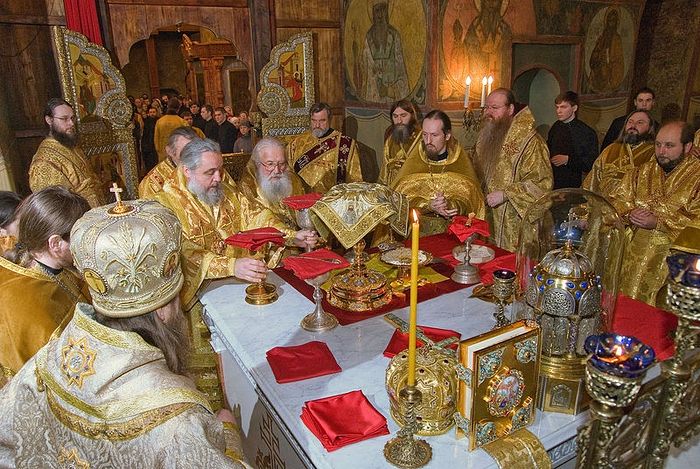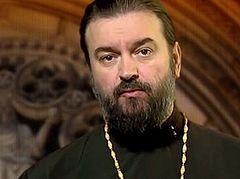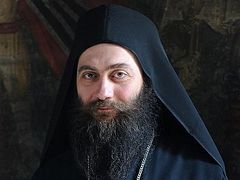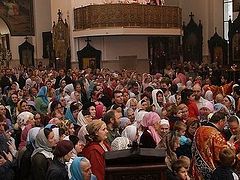At every Liturgy we hear the deacon exclaim: “Let us love one another that with one accord we may confess.” In antiquity, after this exclamation, Christians would kiss each other as a sign of faith, love, and unanimity. This custom is still preserved among the clergy. They all kiss the diskos, chalice, altar, and one another with the words: “Christ is in our midst,” and they answer: “He is and ever shall be!”
But if you ponder what these words mean, we can distinguish three aspects:
The first is the ecclesiological aspect.
“In the Church, the Lord Christ is with every believer, particularly with two or three gathered in His name. Indeed, with every two or three in the Church, the entire Church is among them… all the saints, for it is only with all saints (Eph. 3:18) and through all the saints that a man becomes a member of the Church,” writes St. Justin (Popović).
This aspect is quite well known to Christians; therefore, we will focus on the other two.
The next aspect is anthropological, relating to the composition of man.
Blessed Theophylact of Ohrid explains the Lord’s words: For where two or three are gathered together in my name, there am I in the midst of them (Mt. 18:20), thus:
“You may also understand that when the flesh and the spirit agree, and the flesh does not desire something in opposition to the spirit, then is the Lord there in the midst.”
Or as St. Justin (Popović) writes:
“In the Church, we are all ‘one body,’ all ‘one mind,’ all ‘one heart.’”
Thus, in the thought of the Holy Fathers, the two are the flesh and the spirit, and the three are the body, mind, and heart of man.
For example, let’s take a modern man who has come to church. His body is in church, but that doesn’t mean he is close to Christ. In his mind he is outside the church—his mind meanders all across the universe. The Holy Fathers used to say: “The mind is the workhorse of the heart” (Righteous Alexei Mechev). Wherever his desire sends him, there runs his mind. And if in the old days, Christians had enough problems dealing with one horse, then what can modern man do with a whole “squadron of crazy thoughts?” There is neither desire nor strength to restrain these “dashing horses—let them fly.”1
It takes years, patience, fasting, and humility to curb these stray thoughts. But after entering the Church and after long prayerful labor, a Christian begins to delve into the words of the prayers, to understand the meaning of what is happening at the Church services, and even to experience joy from knowledge of the Gospel truths. But Christ is not near. Why? We need the third and most important component of the spiritual anatomy of man—the heart. Where are you, heart? Alas, our cultural times are called the “the culture of the loss of the heart” (Metropolitan Hierotheos [Vlachos]).
When we find our heart and see that it is the main fortress of stubborness and pride, the pinnacle of selfishness, voluptuousness and avarice, then we will understand the words of the Lord: Repent, for the Kingdom of Heaven is at hand (Mt. 4:17).
We can bend our knees and our head in church as much as we want, but until our heart bends its neck (priestly prayer at Matins), there will be no Christ among us. Until our heart humbles itself, we will not understand what, The Kingdom of God is within you (Lk. 17:21), means.
For where Christ is, there comes His Kingdom, which is not of this world (Jn 18:36).
And the third aspect is mystical (hidden, mysterious), in this case visible only to those who have a pure heart. The Liturgy has finished, and Christians, having communed, go home to their responsibilities and forget these words until the next service. They lose focus, reverence, and sometimes piety. But is there really no Christ between two or three Christians outside of church? Take for example a doctor and his patient, a teacher and a disciple, simple friends, or a Christian family. In Georgia, elderly priests greet each other with these words when they meet. St. Seraphim of Sarov addressed everyone with the words, “Christ is Risen, my joy,” because he knew that Christ is truly in our midst. The Serbian Patriarch Pavle was the same way, conducting himself with others such that their hearts would say, “Christ is in our midst.”
Once the future Patriarch Pavle, when he was the bishop of Raška and Prizren, was walking along Mt. Shara. Not long before, he had been told there was a strange shepherd living high on the mountain, and Vladyka decided to visit him. The bishop found the shepherd in a hut, tending only one sheep.
“Where are the rest of the sheep?” Vladyka asked.
“Some were taken by thieves, some were killed by wolves, and only one remains.”
“What are you going to do, brother?”
“Feed the remaining sheep and pray to God for her to have a lamb. Then there will be more of them.”
Vladyka thought and said: “My dear brother, pray for me too, that I might also preserve my flock, that it might multiply and remain in spite of thieves and wolves.”
After saying this, he started down the mountain.
If we think well of our neighbor, bless him, and do good deeds for him, then if Christ is in our midst, it is first done for Christ, and then for our neighbor.
And if, God forbid, we think poorly and slanderously, we hurt our neighbor, and we do it to Christ first of all, and then to man.
And when, having understood ourselves, finding our hearts and taming our minds, we will bring our perishable bodies to church and attentively listen as the deacon exclaims, “Let us love one another…” then we will turn to our neighbor with all our strength, all our mind, and all our heart, and say: “Christ is in our midst”—and we will hear, “Truly Christ is in our midst. He is and ever shall be.”
Therefore, preparing for the next Liturgy, let us remain alone with ourselves and address our dear hearts, “You are my own heart; labor in the time remaining to us, bend thyself before the humble Christ, and pray that the Lord would come to sup with us (cf. Rev. 3:20). For if He is not in our midst, we will not make it into His eternal Kingdom, where all the saints sing with one mouth and one heart: ‘Indeed, Christ is in our midst, always, both now and ever and unto the ages of ages.’” Amen.




